At the end of November, Lizzie, my beloved beagle mix, passed away. Over the years, I have featured her in my writing and a couple of newsletters so I thought it would be fitting to close out the year with one last piece dedicated to her.
Lizzie was the culmination of one of my life goals: to have a dog.
I had just turned 30 and none of the conditions I had set for dog ownership had been met: I didn’t have a partner to split the responsibility with and I wasn’t making a good, stable income as a journalist. But I was tired of waiting for the right moment to make this particular lifelong dream come true. I decided to go for it, figuring that I’d deal with the challenges as they arose.
As you might imagine, I wasn’t the ideal choice of dog owner for a rescue group (see: precarious income). I submitted a couple of applications but never heard back.
But I wasn’t ready to give up just yet. I was telling everyone I knew that I wanted to adopt a dog, hoping that they might hear something or know someone who might be able to help. And one day, my friend Lindsey said that one of her fellow Pilates teachers was looking to re-home a hound mix named Lizzie who was between 1-2 years old. The Pilates instructor and his now ex-boyfriend had adopted Lizzie from a rescue as a companion for their older dog. But about six months later, the relationship had ended and the instructor’s ex decided to leave the country, taking with him only the dog he had owned for many years. And Lindsey’s coworker, out of a major relationship for the first time in his adult life, wasn’t interested in keeping Lizzie; he wanted to have the freedom to travel, to come and go as he pleased.
So I went to meet Lizzie and within a couple of minutes, she was all over me. Even though I’d like to imagine that this early regard was a sign of a connection between the two of us, I quickly learned that Lizzie warmed up to all humans very quickly; she saw us as bipedal treat dispensers. We would eventually bond with one another but that would take time.
The first night I brought her home, I stared at her curled up on the green armchair opposite my bed and wondered what I had just done to my life for the next ten years. I went from having little responsibility—though my mother’s mental and cognitive decline, which had already begun, was looming at the back of my mind—to becoming the be all and end all for this creature. I knew that this was what I had signed up for before I agreed to take her home with me but it didn’t become real until that first night.
There was a steep learning curve with Lizzie. While I had been warned that she had separation anxiety before I agreed to adopt her, I didn’t realize just how acute it was. About a couple of months in, I suppose after she had grown truly attached to me, Lizzie started freaking out when I left her alone in the apartment, even for just a few moments when I went down the hall to throw a bag of trash down the chute. She destroyed, not one but two crates, twisting and bending the metal bars in a panicked frenzy. Lizzie tore my bike helmet into pieces, leaving blood droplets behind. She chewed up the spines of several books, including a favorite Murakami. I took to hiding my laptop in my bathroom—the only room with a door in my studio— when I had to leave home, reasoning that this was the only thing she might destroy that I couldn’t easily replace or do without since my whole livelihood depended on it.
Meanwhile, of course, I was pursuing remedies for her separation anxiety. I consulted every article online I could find. I tried playing soothing sounds. Relaxing scents. Special treats. A thundershirt. I cordoned off an area inside my small studio with a gate to make a safe space for her (and hopefully keep her away from my stuff). The music made her more anxious because she saw it as a sign that I was soon to leave. The scents did nothing but give me a headache. She managed to get herself out of the thundershirt and over the gate to destroy the aforementioned helmet (leaving a pair of sneakers next to the helmet completely undisturbed). In those early months, every time I stood in front of my door, keys in hand, I’d repeat to myself that I could handle whatever destruction I might find on the other side. There was a part of me that worried that if I didn’t figure this out soon, I might have to re-home her, a devastating thought since I had already grown quite attached to her even if I didn’t show this by gnashing my teeth on the bars of a metal crate.
Finally, I gave medication a try and it worked. Within a week, after the adjustment period was over, she was frisky but calm—or at least calm enough—when I left her alone. After that, she sometimes got mischievous and broke into the recycling if I left her for too long, but was otherwise fine. (But woe unto my bedsheets if I happened to be out when thunder hit; she’d tear a big ol’ hole into them.) Lizzie was off the medication in about a year’s time; the meds calmed her and without that immediate hit of physiological stress, she was able to learn that I would return when I left, even from the garbage chute.
Things then got really good, really fast. We became a recognizable duo all over my apartment building and around my neighborhood. We used to walk past a super of a building halfway down the street from me that we’d pass every morning. “Hi Lizzies,” he’d often say since he only knew her name, not mine. She was the celebrity; I was her sidekick, and I was happy to have it that way.
Lizzie was vocal and gave her opinion freely. I have hundreds of videos of her in which she’s not so much barking but talking. (Weird that I, of all people, ended up with a dog with anxiety who was also a talker.) She was usually expressing her disapproval with my performance as a food dispenser. I used to joke that if she ever developed opposable thumbs, Lizzie would leave me a lot of bad Yelp reviews.
The service in this restaurant is too slow.
The servings are too small.
My request to order off the menu was denied.
Hopefully she wouldn’t have found my performance as a snuggler to be wanting. She was definitely top tier in that department.
One of the greatest gifts that Lizzie gave me was bringing people into my life. Over the years, I’ve gotten to know many of my neighbors, both in my apartment building and around the neighborhood, because of her. The most significant of the connections that she helped me make were with my neighbors who live two flights above me in my Clinton Hill apartment building.
Prior to Lizzie, I only knew Cynthia in passing, a friendly face I’d see in the mailroom or in the elevator which we’d share as I got off on the fourth floor and she continued onto the sixth. In one of those many interactions, I must’ve mentioned that I was a writer because one day she approached me about helping her out with a volunteer project she was involved in; she was supposed to offer writing feedback to a girl in a leadership program. So one afternoon, she dropped by my apartment to have me go over the essay and brought her 9-year-old son, Orion, with her. While we worked, he played with Lizzie. I don’t remember how long they were at my place. Probably no more than an hour or so, but it was an hour that turned out to be quite consequential for both me and Lizzie.
Shortly after they left, I found Orion’s comic book on my desk and texted Cynthia to let her know. She sent Orion back down to pick it up and, of course, he spent several minutes playing with Lizzie while he was at it. Later in the week, I heard from Cynthia again, offering their services to help care for Lizzie while I was in China for the 2014 world championships for book research. I suppose I had mentioned this to her while we worked on the essay and also mentioned that Lizzie was to rotate between three apartments in the building while I was away. But there were a few days in that 3.5 week period that were still unclaimed, as far as Lizzie coverage was concerned. Cynthia’s offer was exactly what I needed to take care of that part of my trip preparation.
Of course, I later learned, it was Orion who suggested this to his mother. He must’ve been paying attention while his mother and I spoke. He wanted a dog, which his mother wasn’t keen on, so he went for the next best thing: my dog.
Orion did a great job of caring for Lizzie, along with help from his mother and older brother, Phoenix, since he was too small to walk her on his own at first. (During the first test walk, Lizzie dragged Orion down the block so I told Cynthia that he couldn’t walk her alone.) Shortly after I got back from Nanning and Hong Kong, Cynthia started texting me to see if I was home so Orion could come over and play with Lizzie. After a few of these messages, I suggested that perhaps it would be better for Orion to pick up Lizzie when I wasn’t home. I had rented a desk at an office near the building to work on the book and was there for most of the day. While it was close enough for me to go home to walk her, it certainly would be better for Lizzie to have Orion’s company instead of her being all alone and bored.
So I gave Cynthia the key to my apartment. Nearly every day, Phoenix would text to let me know that he was picking up Lizzie to meet Orion at his elementary school a block away. When I got home in the evening, Lizzie was rarely there to greet me. I’d drop my bag and trundle two flights up. When I rang the bell, I’d hear her familiar bark—a loud, deep throated one that seemed too big for her—and the sound of her nails on the floor, scampering towards the door. Not only had they walked Lizzie and kept her entertained for hours; they also had fed her dinner. And they invited me in and offered me dinner, too.
Lizzie became a member of their family and was even featured in Orion’s grade school science fair project. One year, he decided to test Lizzie’s reaction times to treats of varying prices. It was a good idea and a well-designed project but I didn’t have the heart to tell him that you didn’t need to test this, at least not with a dog with such an intense food drive like Lizzie. She would go for anything that appeared to be edible and she didn’t play favorites. Lizzie dove for garbage on the street with the same gusto as she did a piece of steak. His results ended up bearing this out: there was no noticeable difference in reaction times, regardless of the quality of the treat.
Lizzie adored the whole family. Over the years when I took her upstairs to their place, she’d howl and cry outside their door until they opened up; she seemed offended that the door to what she regarded as her other apartment wouldn’t automatically open when she arrived. She was so loud that I almost never needed to ring their bell and they never had to check who was on the other side of the keyhole.
I have always gotten along well with my neighbors, no matter where I lived but this bond was unique. And it was all due to our mutual love of the funniest, weirdest, most opinionated beagle mix in the five boroughs.
For the longest time, I joked that Lizzie was like “the Helen Mirren of dogs” for her youthful visage and energy. People were often surprised to learn that she was 9, 10, 11, etc. when they met her on the street. She was getting progressively whiter in the face that used to be majority light brown with light freckles but there was no way for someone meeting her for the first time to know that. Hell, I would often forget how brown she used to be and would be surprised every time I scrolled back more than five years in my iPhone album. Dusting of white aside, Lizzie remained quick and agile, especially when jumping up to grab food from your hand. But Mirren was younger when I started making that joke. Time has marched on for Mirren, Lizzie, and me too. I’m much older than I was when I first adopted her but I dye my grays.
Over the past year, but particularly over the last few months of her life, Lizzie started showing her age. It began with nervous pacing, at first upstairs with Phoenix and Cynthia when I was at the 2023 world championships in Antwerp, but this behavior started to surface with me, too. She’d pace back and forth at night, sometimes working herself into a frenzy. One night, she was so agitated that I had to leash her to the ottoman because she was practically climbing the walls. (She climbed onto shelves she had never ventured towards before and she also got herself repeatedly stuck under my bed and thrashed until I lifted it enough for her to escape.) According to the vet, she was showing signs of doggy dementia. Back she went onto anti-anxiety medication though it wasn’t as effective this time around. She still paced at night though at least she didn’t work herself up into a lather.
And then in October, while I was visiting a friend in Bulgaria, my neighbors told me that Lizzie was peeing in the apartment regularly and was also refusing to eat her kibble though she continued to eat treats with relish. In the decade plus since I adopted her, I could count the number of times on one hand that Lizzie refused food and I didn’t need all five fingers. She was sick on those rare occasions, presumably from eating garbage off the street despite my best efforts to stop her. This didn’t seem to be the problem in October because she was still otherwise hungry and not throwing up. It just seemed that she had suddenly become picky. I suggested they try wet food, which she took to eagerly. Maybe this was simply a sign of old age, I thought, though it unsettled me because one of Lizzie’s defining characteristics was that she’d eat anything edible—or edible adjacent—that wasn’t nailed down.
When I returned from Bulgaria, I took her straight to the vet. She had a UTI and also elevated kidney values, so they started her on antibiotics. Once she completed the course of antibiotics, we’d retest the kidney values. Kidney disease, common in older dogs, the vet explained, could be the reason she rejected her kibble.
The antibiotics seemed to be helping, at least when it came to the accidents; she was having fewer of them. But then I noticed something amiss with her back legs. As we rode back up to the apartment in the elevator, I saw some unusual weight shifting, and she seemed to be struggling to stand and sit though she was walking with no issues.
Back we went to the vet. After a preliminary evaluation, the vet thought it might be a disc issue and told me to reduce her activity. If it didn’t improve, or if it got worse, I’d have to take her to the neurologist. So during our final week together, her walks were short, to the point. Outside to do her business and then straight back in. During this period, the elevator in my building went out twice so I had to carry her up the stairs, which certainly wasn’t great for my disc issue. (Lizzie and I are too much alike, I thought at the time.)
The day before she died was her 13th birthday, at least according to her paperwork though I never celebrated it. I preferred, instead, to commemorate her adoptiversary every year. Usually, I bought her a new toy and a special treat even though she never got me anything. On her 10th “gotcha day” I threw her a party because after a decade of picking up her poop, I thought I deserved to see dogs in party hats. Lizzie, for her trouble, was permitted to eat an entire dog cake—the other dogs got pupcakes. I figured that for once in her life, I’d allow Lizzie to eat as much as she wanted and deal with the consequences. (She threw up the next day.)
On the night of her 13th birthday, Lizzie managed to leap onto the couch even though I had barricaded it with other furniture in my attempt to restrict her activity. As I picked her up and put her safely back on the floor, I thought that it was a good sign—she had been able to get up there even with the living room table and ottoman in her path. She must be improving.
But the next morning, all hell broke loose. Given her recent incontinence issues, I didn’t dawdle in the mornings as I once did, with a cup of coffee and a book, before taking her out for her first walk. I threw sweats over my pajamas while Lizzie paced near the front door, waiting for me to hook the leash onto her harness and take her out. She practically dragged me towards the elevator.
Outside, she peed as normal at the tree in front of our building but when she crouched to poop, something went wrong and she couldn’t stand back up. I picked her up and carried her back into the building. I set her down in her bed and frantically started searching for an emergency vet. The whole time, she was crying in pain and probably fear too. She could no longer use her back legs and so she was dragging herself across the floor, towards me, using just her front paws.
I put her into an IKEA bag and carried her into an Uber. She cried the whole way to Williamsburg but still ate the treats I offered her, which reassured me. That’s my Lizzie, I thought. At the vet, they gave her some pain meds but referred me onto a more advanced animal hospital where she could get surgery for what they suspected was a herniated disc.
Lizzie cried the whole way to the Upper East Side, too, but she still kept taking treats. Still Lizzie, still my girl.
At the hospital, she was taken immediately to be examined. Soon, I was escorted into a clinical room to speak with one of the ER vets. This is when I learned that it wasn’t a disc issue. It was a blood clot. There was no pulse in her back legs. I called a friend who lived across town and asked her to come out to be with me.
My friend arrived shortly before the vet returned with the results of the ultrasound. He seemed more optimistic than he had in our first conversation. Lizzie was breathing well and her heart seemed unaffected. He thought that they could treat the clot and restore at least some function to her back legs. He believed that she had a reasonable chance at a reasonably good outcome.
So I put down an almost $5,000 deposit for the treatment and left the hospital for the day. My friend suggested we get some food since it was already after 1 p.m. and this ordeal had started at 7:30 in the morning. I hadn’t brushed my teeth. I hadn’t eaten. I hadn’t even had coffee.
We found a diner nearby where I did my best to eat. As we were paying the bill, the vet called. Things had gotten worse, dramatically so. Lizzie was throwing clots all over her body. They thought she was having mini strokes. He no longer sounded hopeful.
My friend and I hurried back to the hospital and were ushered into a consultation room. The vet explained that when an animal is hyper-coagulating like Lizzie was, it was either due to steroids—which she wasn’t on—or cancer. And they had seen something suspicious in her intestine on the ultrasound. They could do more testing, he said, but she was declining rapidly. Lizzie was in the ICU on oxygen and had lost responsiveness in parts of her face.
I asked if I could see her and they let me go in there to be with her. I threw half my body into the oxygen chamber and just wept over her and told her I loved her. There were other dogs there in critical states and the staff buzzed about but didn’t intrude. I am sure I was not the first dog owner they saw fall to pieces in the ICU.
It was clear what I needed to do even though it was the last thing in the world that I wanted to do.
I went back to the consultation room with my friend and waited for them to bring her to me. But she jumped up onto the couch last night, I kept saying. To my friend. To the vet. I thought she was getting better. I still feel guilty that I picked her up off the couch, which was her favorite spot in the apartment, that for the final week of her life, I had kept her from it because I thought that this is what was best for her.
When they brought her back to me for the last time, she was on a stretcher with her head propped up on a rolled up towel. I just spent the next, I don’t know, half hour, maybe longer, kissing her, telling her how much I loved her, and how lucky I was to have had her as long as I did. I tried to give her a treat, put it right under her nose, but she didn’t take it. This broke me.
That Friday, I just wanted to give her one last treat. I wanted her to have one more good moment. I wanted to give her one more good day.
At some point, the vet came in with the euthanasia cocktail and explained the process. “This is not a decision I can walk back,” I said. “Am I doing the right thing?” I wanted him to reconsider, tell me that the reasonably good outcome he’d been hoping for when I put down the deposit was still possible.
“If it were my dog, this is what I would do,” he answered.
I told him to go ahead and within a few moments, Lizzie was gone. This hilarious, loving, weird creature that had been the main focus of my life for almost twelve years was gone. I wish I could go back to that first night I spent with her when I was fretting over what I had just done to the next ten years of my life and beg my younger self to dream bigger. Why imagine only ten? Why not fifteen or even twenty years?
When I got home from the animal hospital that Friday evening, I couldn’t bear to go to my empty apartment so I went directly up to my neighbors' place. I hit “6” in the elevator and thought of Lizzie, and how she always seemed to know, even in the elevator, when we were going to their apartment. When the car moved past “4”, she would start fidgeting, and even before the door opened onto “6”, she was already howling and barking. She knew exactly where we were headed. But that night, I rang their doorbell because Lizzie wasn’t there to alert them to my presence.
They already knew. I had been texting my neighbors all day. Orion, now 19, was off at college but Cynthia had already told him.
I sat with them for a while, vacillating between crying and sharing funny stories of Lizzie, of which there are so, so many.
Most of them revolved around food, Lizzie’s unusually strong zeal for it. (I know, I know, all dogs are food motivated but Lizzie was profoundly so.) They talked about the time she stole a slice of pizza from a kid on the playground of Orion’s public school, which was hardly the first time something like that happened. I recalled walking around the neighborhood and being approached by little children who squealed, “Lizzie!” and rushed to pet her. I had never met these kids before but they knew my dog because of all the times that Phoenix brought her to pick up Orion. Lizzie was a playground celebrity.
At the park during off-leash hours, Lizzie stole—or “liberated”—many a treat from the hands of unsuspecting dog owners. Once, only a couple of years ago, she leapt up and stole a bag of treats from a woman who was attempting to reward her Great Dane for his good behavior. Lizzie, for her bad behavior, was rewarded with the whole bag of treats, including the Ziploc. (Don’t worry, she passed it.)
Eating in my apartment was challenging with Lizzie afoot. “Defensive eating” is how I explained it to guests. “You have many thoughts going through your head at any one time and only one of them is aimed at keeping your food away from the dog. Lizzie has but one thought in her head—how to steal your food.” Lizzie always remained vigilant, waiting for that moment when you’d drop your guard, even slightly, and then she’d pounce. But she never hurt anyone. Lizzie was precise in her attacks, taking only the food, and leaving you stunned, impressed by her prowess, but unscathed.
A week after Lizzie died, I spent Thanksgiving with my neighbors at their aunt’s place nearby. On the walk back, Orion asked me to tell him what happened on the day that Lizzie died. I took a deep breath and began. A couple of minutes into the story, I looked to the side and saw that tears were streaming down his face. In all the years that I’ve known Orion, I’ve never seen him cry, not even when he was a little boy, too small to walk Lizzie on his own.
“She was almost as much your dog as she was mine,” I said. “If it all hadn’t happened so quickly, I would’ve tried to have you guys be there with her as well.”
Lizzie’s absence hits me in unexpected ways. For example, when I fill up the coffee machine tank in the morning, I still glance over to where her water bowl used to be to check to see if it also needs to be filled. I didn’t realize that I did that every morning until the first time I made coffee for myself after she passed. At night, I’ll be watching TV on the couch—a far less enjoyable activity now that Lizzie is not around to snuggle—and I’ll think, you can’t change into pajamas just yet because you still have to take Lizzie for her final walk.
I knew that my life revolved around her needs, that her routines were my routines. I now find myself struggling to construct new routines for all the days to come without her.
Lizzie, you were a dream come true. My first dog, my most cherished friend, my family. I hope that wherever you are, you’re getting all the treats that you deserve. And if you’re not, go ahead and steal them.
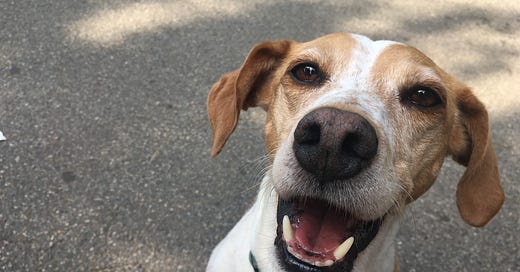


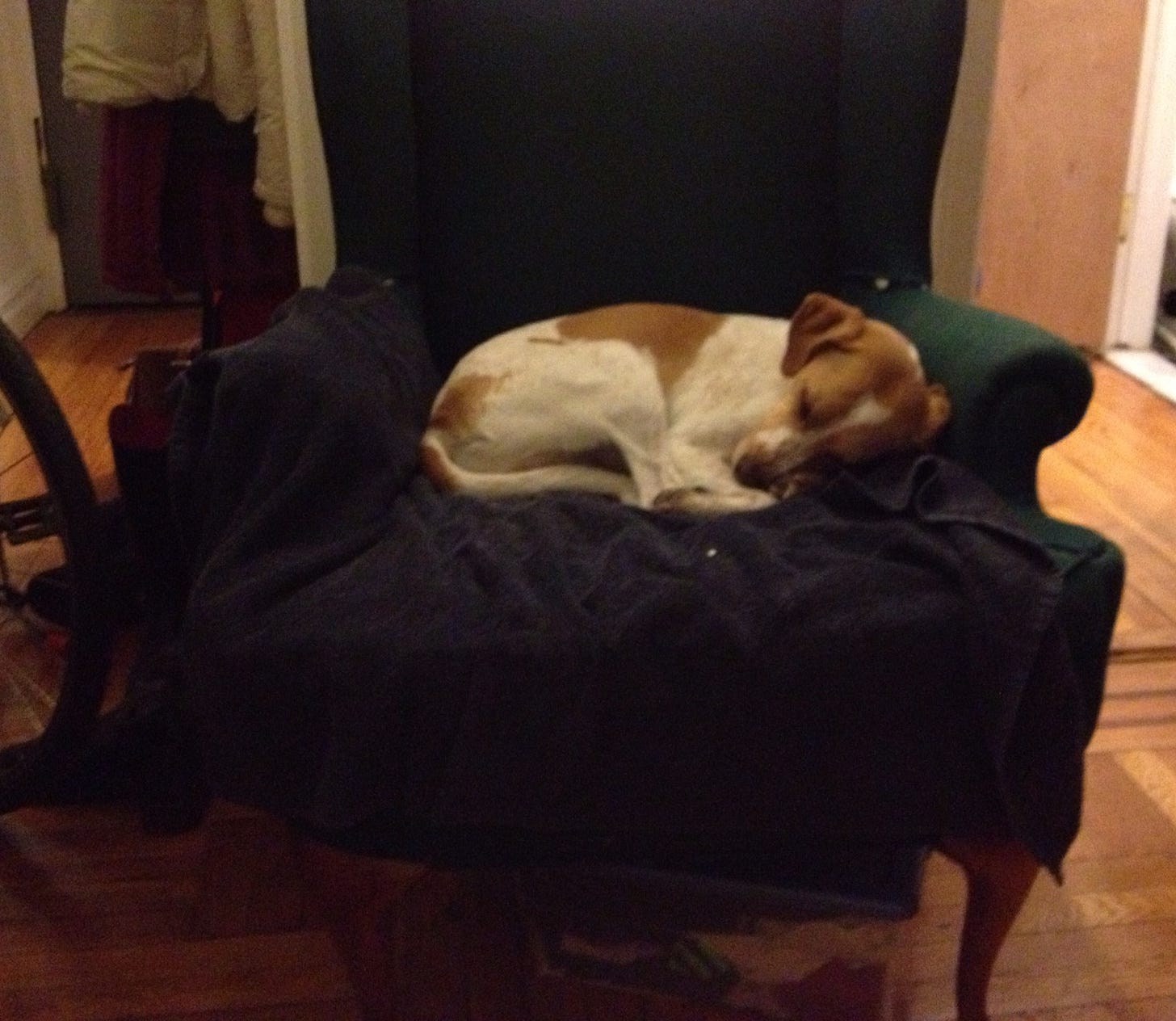
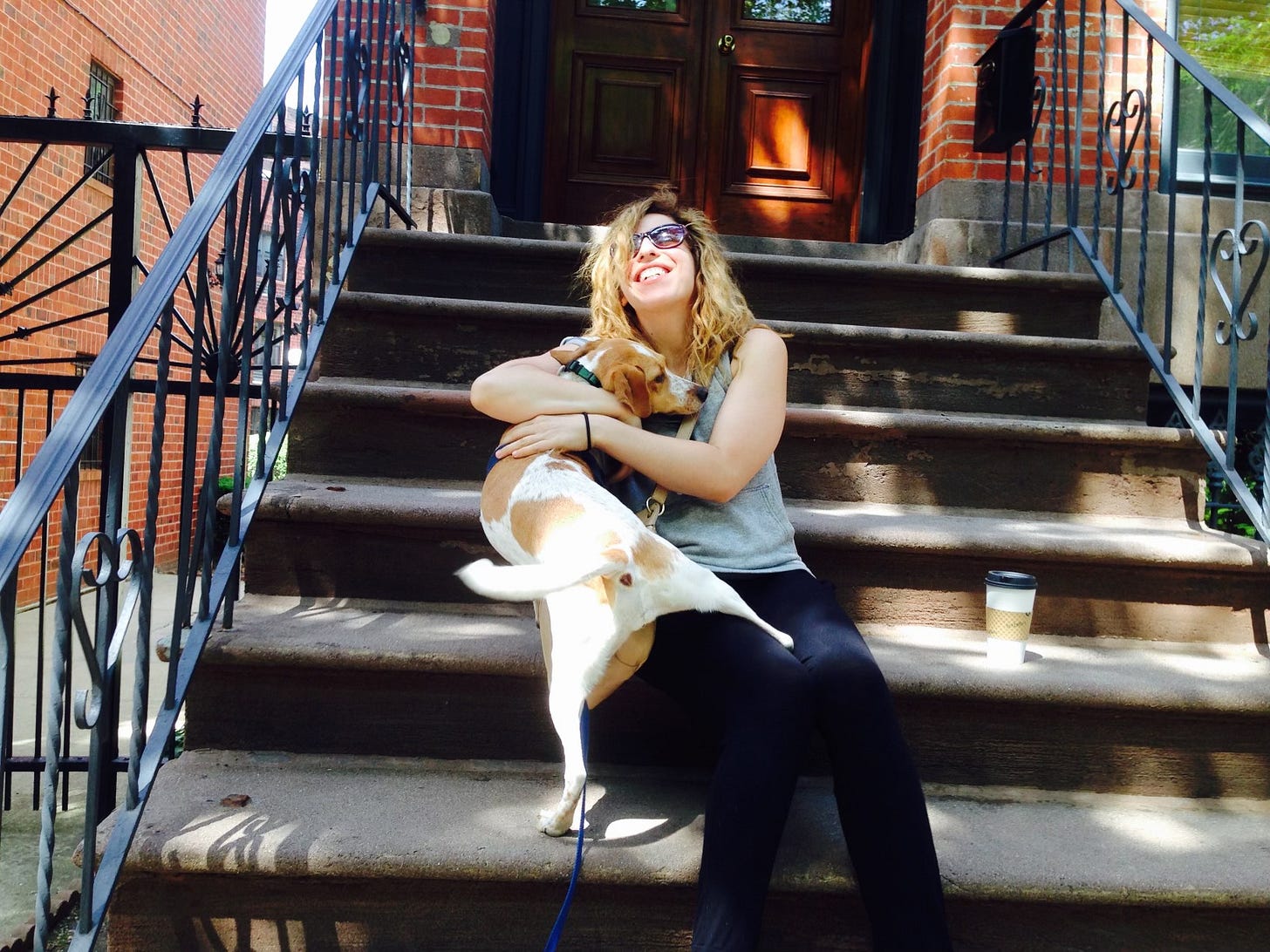

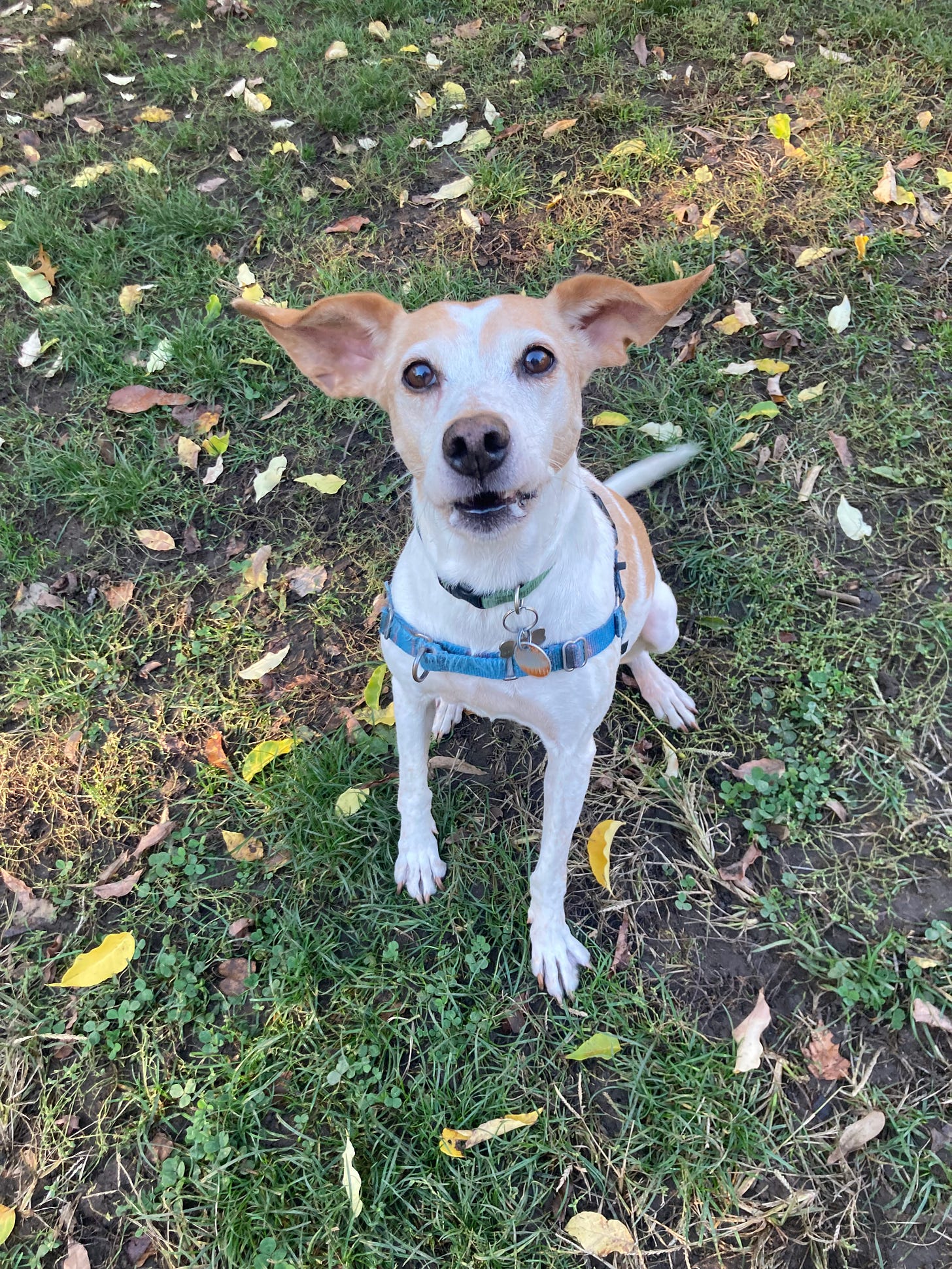
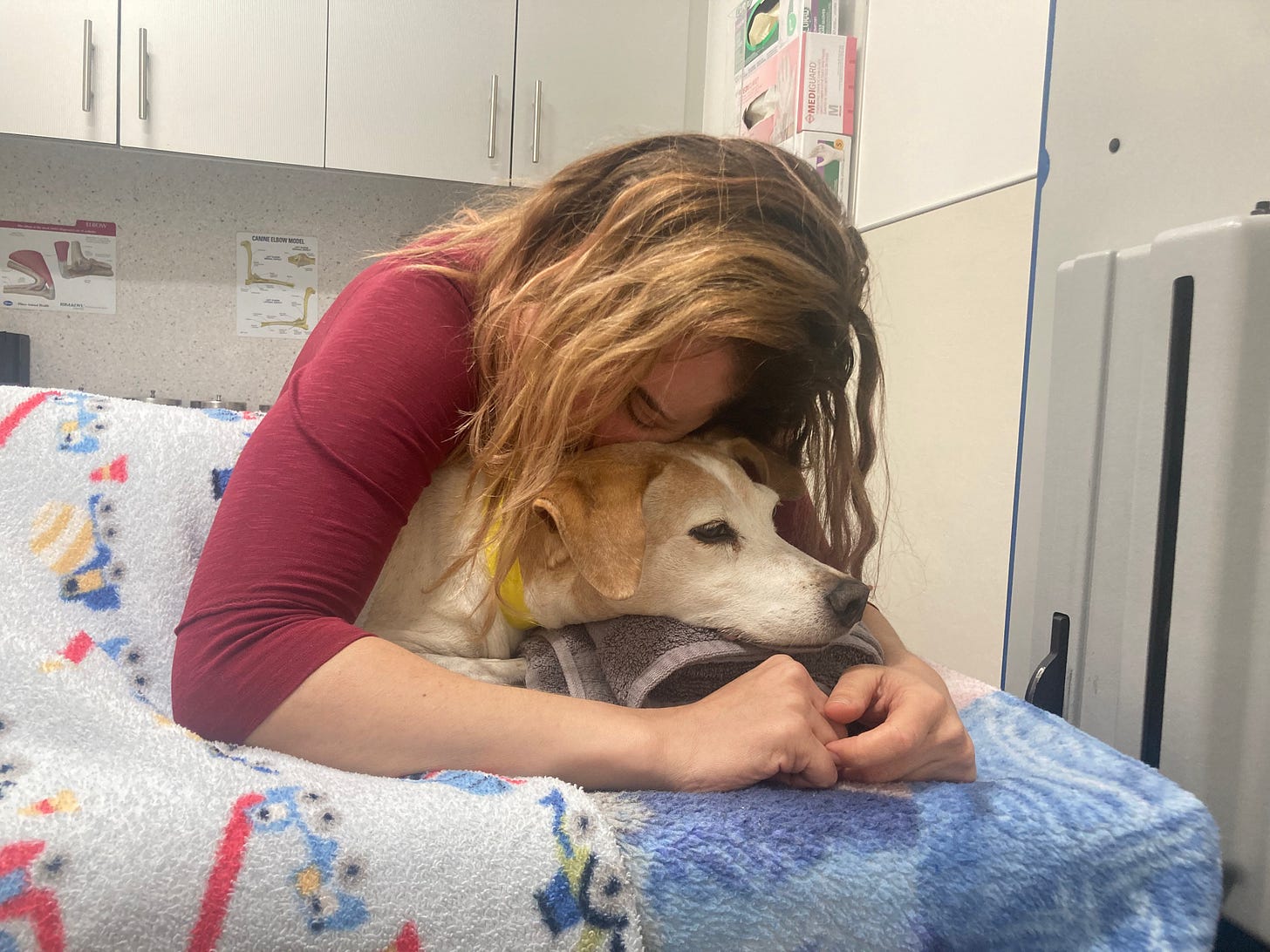
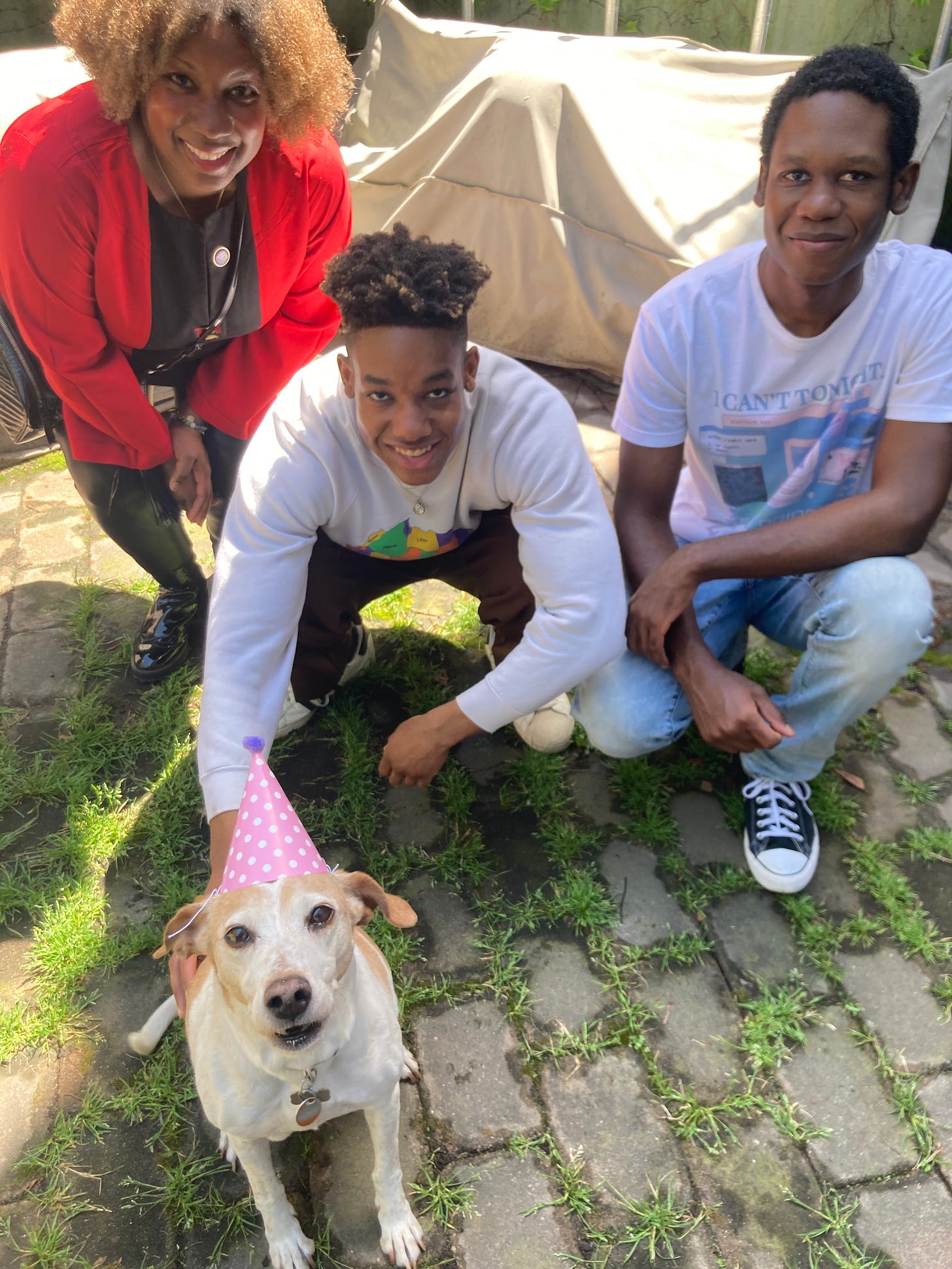
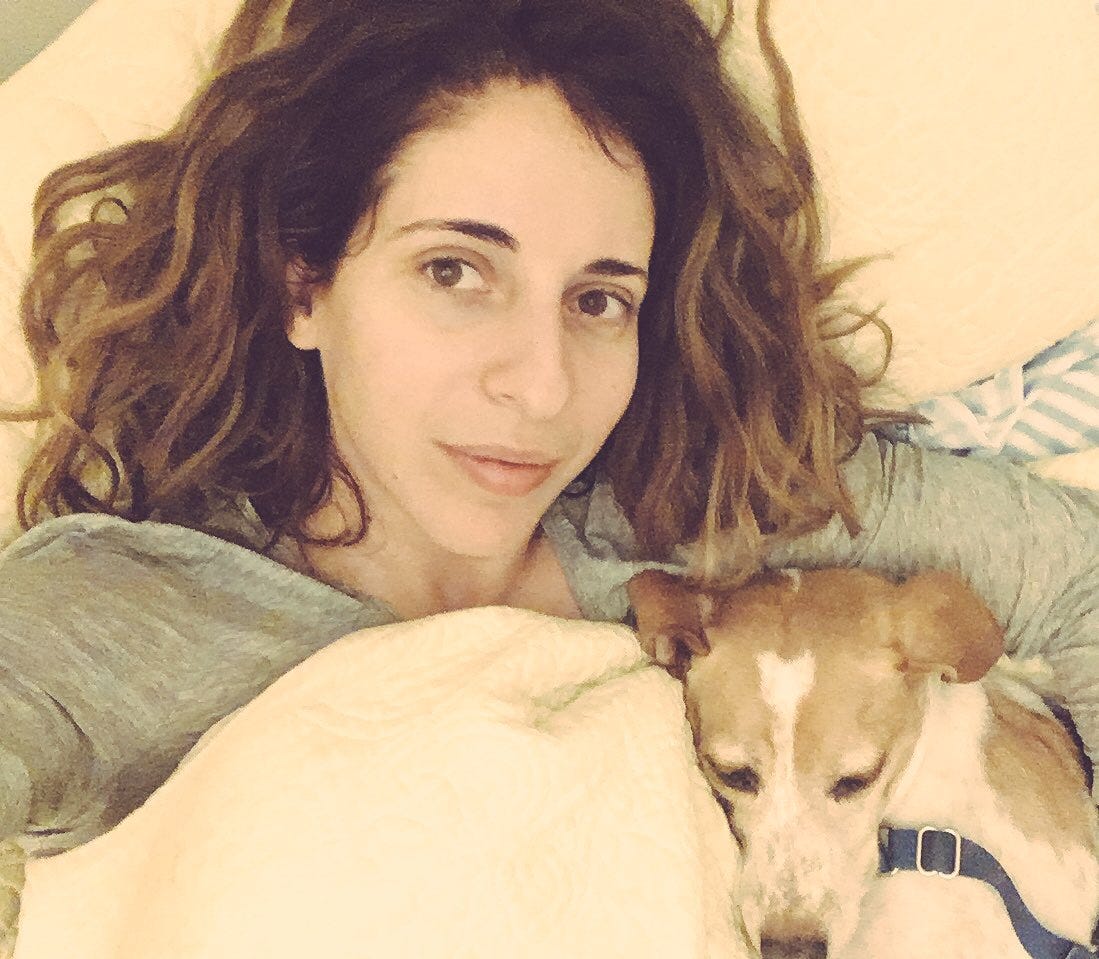
I am so sorry to read this. We have been connected on the gymternet for years and always loved your posts that included Lizzie.
What a loving recollection of Lizzie’s time with you. Thank you for sharing so much of her with us. May her memory be a blessing.